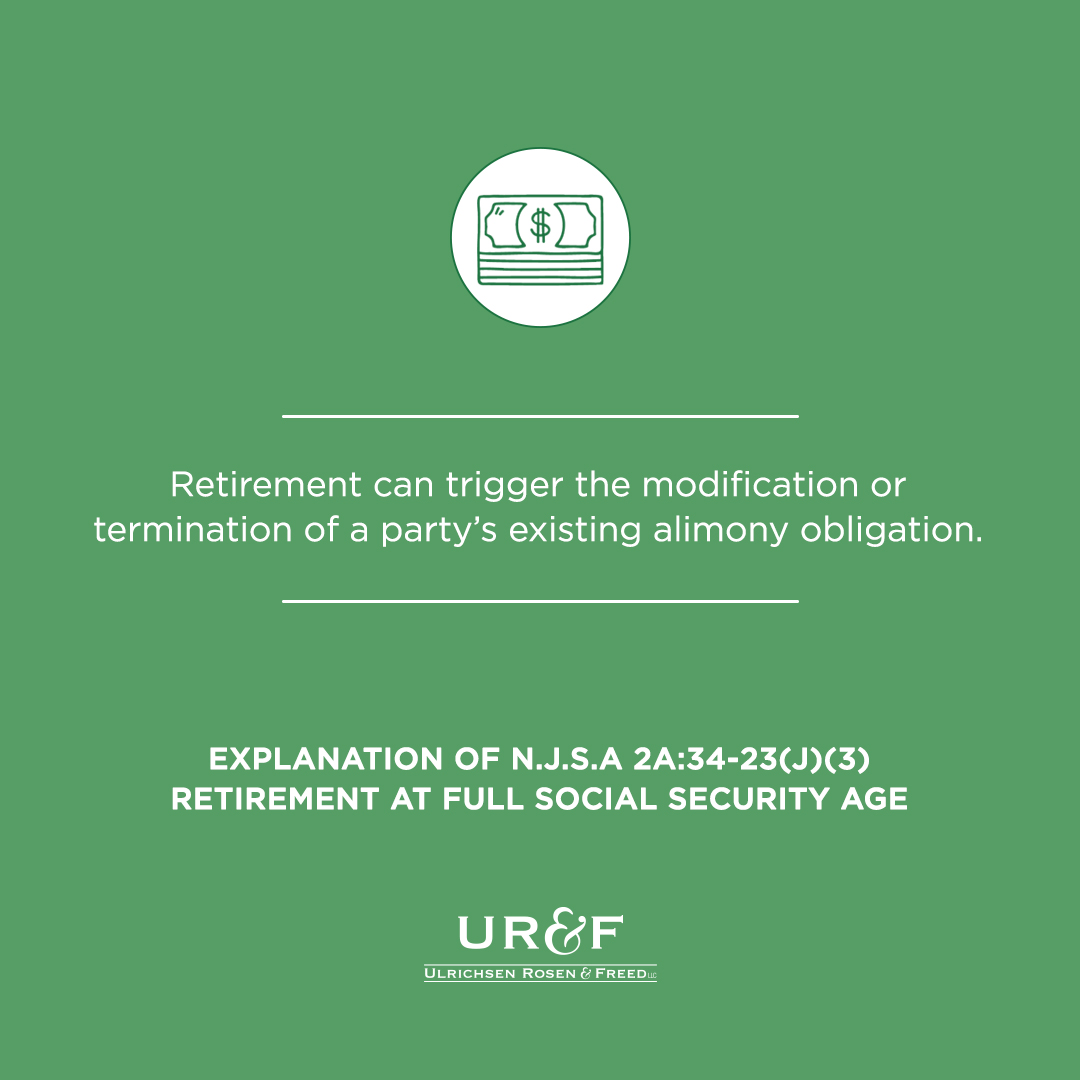Explanation of N.J.S.A 2A:34-23(j)(3)
Retirement can trigger the modification or termination of a party’s existing alimony obligation.
N.J.S.A 2A:34-23(j)(3) governs the effect of retirement on final alimony awards entered prior to September 10, 2014. Pursuant to N.J.S.A 2A:34-23(j)(1), the obligor’s “reaching full retirement age… [is] deemed a good faith retirement age.” A full retirement age is defined as “the age at which a person is eligible to receive full retirement for full Social Security retirement benefits under section 416 of the federal Social Security Act.” Landers v. Landers, 444 N.J. Super. 315, 322 (App. Div. 2016) citing 42 U.S.C. § 416.
When filing an application to modify or terminate an alimony obligation entered prior to September 10, 2014, the burden of proof lies with the obligor to establish by a preponderance of the evidence that the modification or termination of alimony is appropriate. The Court must consider the ability of the recipient party to have saved adequately for retirement and the following factors:
The age and health of the parties at the time of the application;
- The paying party’s field of employment and the generally accepted age of retirement for those in that field;
- The age when the paying party becomes eligible for retirement at the paying party’s place of employment, including mandatory retirement dates or the dates upon which continued employment would no longer increase retirement benefits;
- The paying party’s motives in retiring, including any pressures to retire applied by the paying party’s employer or incentive plans offered by the paying party’s employer;
- The reasonable expectations of the parties regarding retirement during the marriage or civil union and at the time of the divorce or dissolution;
- The ability of the paying party to maintain support payments following retirement, including whether the paying party will continue to be employed part-time or work reduced hours;
- The recipient party’s level of financial independence and the financial impact of the obligor’s retirement upon the recipient party; and
- Any other relevant factors affecting the parties’ respective financial positions.
See N.J.S.A. 2A:34-23(j)(3)
A full and complete version of N.J.S.A 2A:34-23(j)(3) is cited below:
(3) When a retirement application is filed in cases in which there is an existing final alimony order or enforceable written agreement established prior to the effective date of this act, the obligor’s reaching full retirement age as defined in this section shall be deemed a good faith retirement age. Upon application by the obligor to modify or terminate alimony, both the obligor’s application to the court for modification or termination of alimony and the obligee’s response to the application shall be accompanied by current Case Information Statements or other relevant documents as required by the Rules of Court, as well as the Case Information Statements or other documents from the date of entry of the original alimony award and from the date of any subsequent modification. In making its determination, the court shall consider the ability of the obligee to have saved adequately for retirement as well as the following factors in order to determine whether the obligor, by a preponderance of the evidence, has demonstrated that modification or termination of alimony is appropriate:
(a) The age and health of the parties at the time of the application; (b) The obligor’s field of employment and the generally accepted age of retirement for those in that field;
(c) The age when the obligor becomes eligible for retirement at the obligor’s place of employment, including mandatory retirement dates or the dates upon which continued employment would no longer increase retirement benefits;
(d) The obligor’s motives in retiring, including any pressures to retire applied by the obligor’s employer or incentive plans offered by the obligor’s employer;
(e) The reasonable expectations of the parties regarding retirement during the marriage or civil union and at the time of the divorce or dissolution;
(f) The ability of the obligor to maintain support payments following retirement, including whether the obligor will continue to be employed part-time or work reduced hours;
(g) The obligee’s level of financial independence and the financial impact of the obligor’s retirement upon the obligee; and
(h) Any other relevant factors affecting the parties’ respective financial positions.
N.J.S.A. 2A:34-23(j)(3)
For questions regarding modifying alimony obligations, retirement or any other family law related issue, please contact the attorneys of Ulrichsen Rosen & Freed LLC. Our firm is focused exclusively on the practice of family law and serves clients throughout New Jersey including clients residing in Mercer County, Somerset County, Hunterdon County, Burlington County and Middlesex County.


